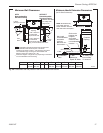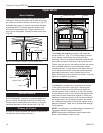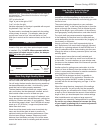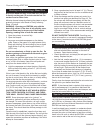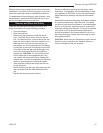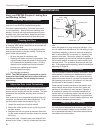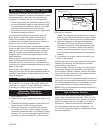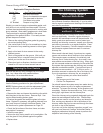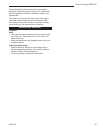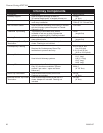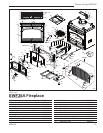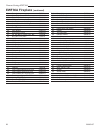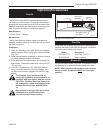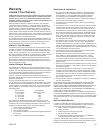Special offers from our partners!

Find Replacement BBQ Parts for 20,308 Models. Repair your BBQ today.

29
Vermont Castings EWF36A
20005167
Optional Accessories
Fan Kit
FK26 Fan
The FK26 fan helps distribute heated air from within
the firebox out into the room. The fan is controlled by a
snapstat that turns power on and off as the firebox tem-
perature rises above and falls below a preset tempera-
ture. A rheostat provides for variable fan speeds.
Specifications
115 Volt / 60Hz / .75 Amps
Maintenance
The fan itself does not require regular maintenance,
however, periodic cleaning of the fan and the surround-
ing area is required.
Installation
1. Place fan assembly at the back of the unit between
hearth supports. Attach using velcro strips provided.
(Fig. 33)
2. Install thermal sensor (snapstat) on bottom of firebox
by sliding between bracket and firebox.
3. Place electronic fan speed control box (rheostat) to
side bracket. Fasten fan speed control box with #10
- 24 hex nuts.
4. If the EB-1 receptacle box (Pt. #ZA1200) was cor-
rectly connected when the unit was installed, the
fan lead can be directly plugged into the EB-1 plug
socket.
The fireplace, when installed must be
electrically connected and grounded in ac-
cordance with local codes, with the current
CSA C22.1 Canadian Electrical Code or for
US installations, follow local codes and the
National Electrical Code, ANSI/NFPA No.
70.
Any electrical rewiring of this fan must be
completed by a qualified electrician.
Turn off all power before hook up.
FP1323
FK26 fan install
2/27/03 djt
Fan
Heat Sensor
(Snapstat)
Electrical
Box
Fan Speed Switch
(Rheostat)
FP1323
Fig. 33 FK26 fan placement.
Trim Kits
A cast face trim kit and a cast louvre kit are available to
enhance the look of your EWF36A fireplace. Installation
instructions are included with the kit.
Model Description
EWF36ACFTK Cast Face Trim Kit
EWF36ACLK Cast Louvre Kit
Screen Kit
An optional spark screen, EWF36S, is available to allow
the fireplace to be operated with the doors fully open.
NOTE: When operated with the doors open and the
screen in place, the damper MUST be in the open
position.



